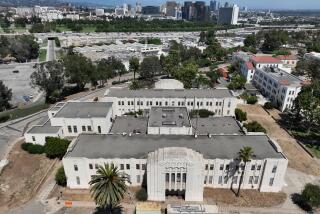WWII Memorial Will Enhance National Mall, Not Mar It
On Veterans Day, Nov. 11, groundbreaking is planned in Washington, D.C., for the long overdue World War II Memorial.
Art critic Christopher Knight has been extremely critical of the memorial plans (“Inheritance Endangered,” Aug. 22). On the other hand, more than 400,000 citizens have offered financial contributions and letters of support, and 450 veterans groups representing 11 million veterans are behind the project.
Knight is passionate in claiming that a small group of bureaucrats is acting in complete disregard for public sentiment and the law. It is too bad that his passion is not tempered with an equal amount of accuracy.
Despite Knight’s belief that planners are not considering the views of dissenters, the fact is there have been 17 public and three congressional hearings regarding the memorial since 1995.
I attended the Commission of Fine Arts hearing in July of this year, at which the commission unanimously endorsed the current architectural plans for the memorial; the meeting was lengthened specifically to allow for additional public comment. It is presumptuous to assume that the views of those who dissented were not considered. They simply did not carry the day.
Nor has there been a “waiver” of a “required” environmental impact statement in regard to the memorial, as Knight asserts. The law does require that the National Park Service conduct an environmental assessment. It did so in 1998, concluding that plans would cause “no significant impact.” That finding made an environmental impact statement unnecessary.
The National Park Service’s compliance with Section 106 of the National Historic Preservation Act in regard to the Advisory Council on Historic Preservation’s role was also questioned by Knight. Unfortunately, the Commemorative Works Act of 1986 conflicts with Section 106 in certain respects. The advisory council’s staff recognizes the conflict. And though some members of the council may disagree with the National Park Service’s interpretation in resolving the conflict, the park service’s method is a valid one.
It should also be noted that the advisory council is just that: an “advisory” council to the Secretary of the Interior. The council makes only recommendations.
The three entities that must actually approve the memorial as to site and design--the National Park Service, the Commission of Fine Arts and the National Capital Planning Commission--have time and again considered and accepted the various stages of the design plan since the memorial’s location on the National Mall was approved in 1995.
The Commemorative Works Act states that a proposed memorial shall not encroach on an existing work. Knight feels that placing the WWII Memorial on the Lincoln Memorial’s grounds violates this requirement.
First, it must be noted that a 1922 report of the Lincoln Memorial Commission specifically held that the Rainbow Pool and the larger--and more widely known and recognized--Reflecting Pool were “not part of the [Lincoln] Memorial.”
The only part of the National Mall that will be altered by the memorial is the Rainbow Pool. The existing pond is not a pretty sight. Several fountains do not function at all. Those that do barely drizzle water out of the pipes. The water is stagnant. The WWII Memorial will be built around a refurbished Rainbow Pool. Rather than an encroachment, the WWII Memorial will be an enhancement. It will neither detract nor distract from the panoramic view from the Washington Monument to the Lincoln Memorial.
The bottom line is that no laws have been “kicked to the curb.” No “destructive” precedents have been set.
I hope that, in the not too distant future, this magnificent monument to the brave men and women who, at home and abroad, participated in World War II will be completed at a site befitting the honor they earned and the debt they are owed. Let us do it now, before there are no World War II veterans alive to see it.
*
Counterpunch is a weekly feature designed to let readers respond to reviews or stories about entertainment and the arts. Please send proposals to Counterpunch, Calendar, Los Angeles Times, 202 W. 1st St., Los Angeles, CA 90012. Or fax: (213) 237-7630. Or e-mail: Counterpunch@latimes.com. Important: Include full name, address and phone number. Please do not exceed 600 words. We appreciate all proposals and regret that we cannot respond to each.
More to Read
The biggest entertainment stories
Get our big stories about Hollywood, film, television, music, arts, culture and more right in your inbox as soon as they publish.
You may occasionally receive promotional content from the Los Angeles Times.










